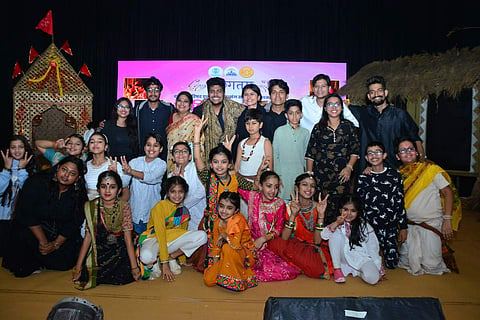
- LIFESTYLE
- FASHION
- FOOD
- ENTERTAINMENT
- EVENTS
- CULTURE
- VIDEOS
- WEB STORIES
- GALLERIES
- GADGETS
- CAR & BIKE
- SOCIETY
- TRAVEL
- NORTH EAST
- INDULGE CONNECT

The theatre has found a renewed life with the younger generation gradually making their shift towards it with growing interest. Not only is the theatrical form of storytelling working in classrooms, but it is also as part of the academic, co-curricular, and general overall development of the future generation. The Shriek of Silence theatre group in this regard has worked commendably in generating curiosity among today’s youths and of course, incorporating them in the process itself. Their recent production, Once Upon a Time in India held at Science City, was a musical inspired by Ashutosh Gowariker and Aamir Khan’s critically acclaimed movie Lagaan. The script, direction, choreography, and production design were undertaken by Shriek of Silence (SOS) while it was hosted by Friends of Tribal Society.
The script was molded based on adapting the British-era sports drama for today's youngsters. It’s a tale about courage, unity, hope, and standing up for oneself, which was performed by actors between the ages of six and twelve. Ritwika Chaudhuri, creative director of Shriek of Silence, comments, “This is the second show of Once Upon a Time in India. Their growth in areas of confidence, public speaking abilities, and becoming a free-flowing performer on stage is commendable. Theatre is a slice of life and it is continuously teaching these children ethics, teamwork, and stories from the real world. The way the children performed, especially on this day, was nothing less than professionals, ably knowing stage compositions, choreography, how to use lights to the best of your abilities, and synchronization.”
What is interesting is that through the drama, the preparation, and the learning, the young performers have been able to inculcate lifelong lessons. The primary focus was to introduce theatre to new audiences and most importantly, today’s young audience. This multi-lingual play not only had veterans but also young ones accompanied by their parents. This opened doors for a new wave of thought for theatre. Siddhika Jalan, a parent, comments, “There’s no right time. Just time - and what you do with it...It’s been beautiful seeing Shivank (Bhuvan) and Shivana (Lali) spend their time strengthening bonds, creating memories, and sharpening skills amidst endless laughter and antics! To be teaching children the essence of hard work and turning them into lifelong learners whilst having fun is great!”
Once Upon a Time in India is a period drama that allowed the performers to travel back in time. From their community feelings to societal problems, lifestyle, language, dialect, and much more were all explored by them giving them insights into the seeds of Indian values. Varsha Todi, whose daughter Swarna plays Yashoda Ma says, “Swarna has learned so much in these three plays that she has done with SOS is unexplainable. She has learned to be consistent, sharing her thoughts and knowledge, and understanding what it is to be working as a team.”
Art and performing arts have always been the pioneers for reformation and inculcating social ideas among audiences. Interestingly, the performers here are also donating a part of their pocket money to promote education among the underprivileged. This teaches them the values of education for all, respect for all, and the ability to help when one can and most importantly, to become socially responsible. Vasuprada Dalmia’s daughters Radhya and Navya, were a part of the play. She mentions, “Rehearsing and performing for a cause has taught Radhya and Navya that every act matters, and when they form bonds and have fun along the way, it just makes the entire journey more worthwhile.”
Lastly, theatre itself is a means to keep every actor engaged and involved. It’s a medium that not only imparts knowledge but also instills discipline and high observation skills. It reduces time off mobile phones and bridges the gap between reality and fiction where individuals are more aware of the ground realities than the sugar-coated or made-up ones.